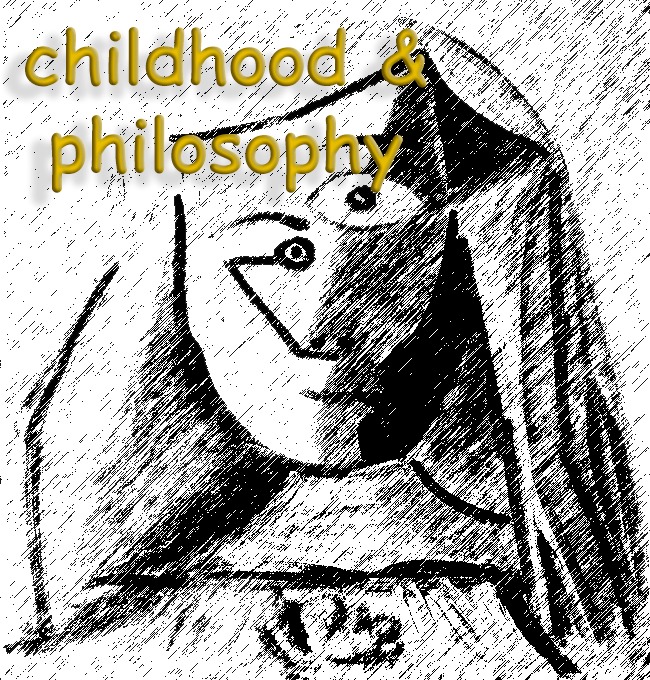el teatro-foro se encuentra con la filosofía para/con niños: exploración corporal de situaciones difíciles en la comunidad de investigación filosófica
DOI:
https://doi.org/10.12957/childphilo.2021.53904Palabras clave:
teatro-foro, filosofía para/con niños, teatro del oprimido, corporalidad, educación teatral.Resumen
Este artículo introduce las prácticas teatrales de Augusto Boal, específicamente las del teatro-foro, en el movimiento de Filosofía para/con Niños [Fp/cN]. Al conectar la pedagogía de Boal con la Fp/cN, mostramos cómo las técnicas del teatro-foro pueden dar a los niños-participantes el poder de involucrarse en Comunidades de Investigación Filosófica [CIFs] centradas en situaciones difíciles que experimentan. Para hacer esto, introducimos y compendiamos algunos aspectos de la pedagogía de Boal, incluyendo sus perspectivas teóricas y marcos metodológicos, con extensas referencias a su libro Teatro del Oprimido. Continuamos con una discusión de algunas de las conexiones entre el movimiento del Teatro del Oprimido y Fp/cN; específicamente, observamos las concepciones similares que ambos movimientos tienen respecto de la relación entre uno mismo y la comunidad, y el rol metodológico similar que juegan estímulos y facilitadores. Cerramos con una presentación de varias maneras en que practicantes teatrales y educadores han usado el teatro-foro con niños y niñas, y sugerimos cómo los facilitadores de Fp/cN podrían utilizar los métodos de Boal en la CIF. Esperamos generar la impresión de que el trabajo de Boal ofrece herramientas metodológicas y perspectivas teóricas que pueden suplementar el movimiento de Fp/cN a los fines de crear espacios más corporales, creativos e inclusivos para el trabajo filosófico. Por último, alegamos que la unidad de estos dos movimientos tiene mucho más para aportar al actual desarrollo de prácticas pedagógicas en Fp/cN. Por lo tanto, hacemos una llamada a multiplicar las investigaciones acerca de los métodos de Boal y otras prácticas teatrales participativas en la CIF.
Descargas
Citas
Babbage, F. (2018). Augusto Boal. Routledge.
Boal, A. (1992). Games for Actors and Non-Actors (A. Jackson, Trans.). Routledge.
Boal, A. (2008). Theatre of the Oppressed (C. A. McBride, M.-O. L. McBride, & E. Fryer, Trans.). Pluto Press.
Brett-MacLean, P., Yiu, V., & Farooq, A. (2012). Exploring Professionalism in Undergraduate Medical and Dental Education through Forum Theatre. Journal for Learning through the Arts: A Research Journal on Arts Integration in Schools and Communities, 8(1). http://escholarship.org/uc/item/50p2s33s
Chan, Y.-L. J., & Chan, B. Y. Y. (2015). Applying Forum Theatre as a Community Design Method: A Collaboration Between Landscape Architecture and Theatre Education.
P-e-r-f-o-r-m-a-n-c-e, 2(1–2). http://www.p-e-r-f-o-r-m-a-n-c-e.org?p=3456
de Bruyn, A. D. (2018). Educating the Philosophical Imagination [Degree of Masters]. Columbia University.
Desai, S. R. (2017). Utilizing Theatre of the Oppressed Within Teacher Education to Create Emancipatory Teachers. Multicultural Perspectives, 19(4), 229–233. https://doi.org/10.1080/15210960.2017.1347875
D’Olimpio, L., & Teschers, C. (2015). Playing with philosophy: Gestures, performance, P4C and an art of living. Conference for The Philosophy of Education Society of Australasia (PESA).
Dwyer, P. (2005). “Theoria Negativa”: Making Sense of Boal’s Reading of Aristotle. Modern Drama, 48(4), 635–658. http://dx.doi.org/10.3138/md.48.4.635
Freire, P. (2000). Pedagogy of the Oppressed (M. B. Ramos, Trans.). Bloomsbury Academic, an imprint of Bloomsbury Publishing Inc.
Gardner, S. (2017). Human Agency: Its Pedagogical Implications. International Journal of Applied Philosophy. https://doi.org/10.5840/ijap20181485
Gourd, K. M., & Gourd, T. Y. (2011). Enacting Democracy: Using Forum Theatre to Confront Bullying. Equity & Excellence in Education, 44(3), 403–419. https://doi.org/10.1080/10665684.2011.589275
Gregory, M. R. (2007). A Framework for Facilitating Classroom Dialogue. Teaching Philosophy, 30(1), 59–84. https://doi.org/10.5840/teachphil200730141
Hall, D. (2003). Philosophy, Power and Performance. Analytic Teaching, 22(2), 136–155. https://journal.viterbo.edu/index.php/at/article/view/762?fbclid=IwAR2QqCqN9tIkyNS-rabQOC-RyC_Wwq4SaLi1i0Xl4sVEhErrb82b1BaWHDk
Hamel, S. (2015). Translation between Academic Research, Community and Practice: A Forum Theatre Process. Canadian Journal of Action Research, 16(3). htt://journals.nipissingu.ca/index.php/cjar/article/view/226ps
Hammond, N. (2015). Forum Theatre for Children: Enhancing Social, Emotional and Creative Development. Trentham Books.
Kohan, W. O. (2018). Paulo Freire and Philosophy for Children: A Critical Dialogue. Studies in
Philosophy & Education, 37, 615–629. https://doi.org/10.1007/s11217-018-9613-8
Lipman, M. (1992). Thinking in Education. Cambridge University Press.
Lipman, M., Sharp, A. M., & Oscanyan, F. S. (1980). Philosophy in the Classroom (2nd ed.). Temple University Press.
Ludwig, T. (2012). Just Kidding. CNIB.
Preston-Roedder, E. (2020). What Can Philosophy Learn from Improvisational Theater? Precollege Philosophy and Public Practice, 2, 18-35. https://doi.org/10.5840/p420204112
Reason, M. (2008). Thinking Theatre: Enhancing children’s theatrical experiences through philosophical enquiry. Childhood & Philosophy, 4(7), 115–145. http://ray.yorksj.ac.uk/id/eprint/913/
Rice, M., Newell, A., & Morgan, M. (2007). Forum Theatre as a requirements gathering methodology in the design of a home telecommunication system for older adults. Behaviour & Information Technology, 26(4), 323–331. https://doi.org/10.1080/01449290601177045
Schertz, M. (2007). Avoiding ‘passive empathy’ with Philosophy for Children. Journal of Moral Education, 36(2), 185–198. https://doi.org/10.1080/03057240701325308
Descargas
Publicado
Número
Sección
Licencia
el copyright de cada artículo pertenece a cada autor. childhood & philosophy tiene el derecho a la primera publicación. el permiso de reimprimir cualquier artículo que haya aparecido en la revista necesita de la autorización escrita del autor. en adisión a cualquier forma de reconocimiento requerido por el autor el siguiente aviso debe ser añadido a la declaración de permiso en la reimpresión (con los números apropiados a los puntos suspensivos): [título del artículo] fue publicado originalmente en la infancia y la filosofía, tomo ..., número ..., pp. ...-...




